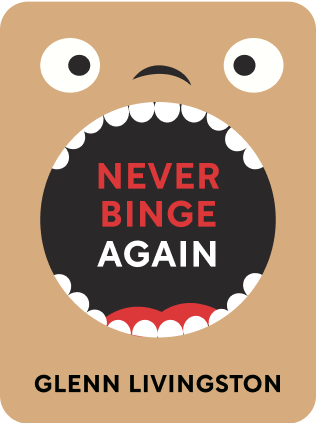

This article is an excerpt from the Shortform book guide to "Never Binge Again" by Glenn Livingston. Shortform has the world's best summaries and analyses of books you should be reading.
Like this article? Sign up for a free trial here .
Are you trying to eat healthily but keep running into obstacles? Do you want advice on how to stop sabotaging your diet?
In his book Never Binge Again, Dr. Glenn Livingston discusses the most common reasons why food plans fail and how to overcome them. There are so many ways we sabotage our diets: from cravings to social pressure to trauma. But Dr. Livingston goes over all of them and how to fight back.
Continue reading to learn how to stop sabotaging your diet.
Troubleshooting Your Diet
Never Binge Again addresses a number of common setbacks that weaken your resolve and make you listen to the Pig. Here is how to stop sabotaging your diet:
Dealing with Cravings
Once you set your Food Plan, your response to cravings is simple:
- Remember that consuming any Pig Slop is a Binge.
- Remember that all thoughts that want you to Binge are Pig Squeals. You don’t have the cravings, your Pig does. ALL cravings are Pig Squeal. Every craving is nothing more than a desire for Pig Slop.
- Repeat to yourself: “I will never eat Pig Slop again! I will remain 100% committed to my Food Plan until my dying breath.
Eat according to your Food Plan, and your cravings will subside.
Your only job is to kill the craving. It is NOT to get high on what you crave. You only want to eliminate the craving to get on with your day—your Pig wants to get high with food.
Killing a craving is like pouring water on a fire in your backyard so you don’t burn down the house. Getting high with food is like throwing gasoline on the fire and inhaling the fumes.
Also consider contentment vs mania. Contentment is a gentle state of mind that is repeatable, sustainable, and responsible. Mania is unstable—it’s a temporary pleasure that becomes more difficult to repeat, like drug addicts “chasing the dragon.”
Remember the exercise about what you deprive yourself of by not indulging your craving, and what you deprive yourself of by indulging.
Dealing with Discomfort
Some may think that any plan that is going to work should be easy and comfortable at all times. Thus, any food plan that causes discomfort is probably wrong, and Binging is the way to alleviate discomfort.
This is insane. Does any good thing come with zero discomfort? Does your favorite athlete get to where he or she is with complete comfort? Is building a billion dollar company easy the entire way?
You do NOT need to be comfortable to stick to your food plan. There will be times where you feel uncomfortable. Your Pig must know it will NEVER consider this time to be Binging opportunities.
Just because you’re uncomfortable does NOT mean you will die. Your body is used to binging, and if you suddenly take away its Food High food, it’ll think you’re starving. You are not starving. Even if you ate zero calories, it would take weeks for you to starve to death.
You have greater ability to tolerate discomfort than you think. You need to want it enough.
- Here’s a thought exercise: picture someone you love dearly—your child, spouse, parent, or pet. Now think of a Never food. Now imagine that there’s a kidnapper watching this person at all times. If you ever eat your Never food again, the kidnapper will abduct that person and you’ll never hear from this person again. The ONLY way to keep this person safe is to abstain from that Never food again. What would you do?
- It’s a no-brainer—you’d easily avoid the Never food, because the consequences are so bad. This is the extent of your ability to tolerate discomfort.
That said, humans seek sustenance when 1) nutrients are depleted, 2) they’re cold, 3) when blood sugar drops low. To counter this, stay warm and hydrated, and eat regular, consistent healthy meals.
Dealing with Social Problems
The social environment around you has most likely developed to encourage you to Binge. Friends and family will continue indulging in your new Never foods; you’ll be invited to break your Conditionals; your Always foods might be joked at.
First, don’t deal with other people’s problems.
Recognize that you don’t need validation of your plan. Don’t go seeking approval for what you’re doing. You own 100% responsibility for your health and goals—other people aren’t going to be feeling your weight or diabetes—so why should they have a say in what you eat?
You will never get 100% acceptance from all the important people in your life for everything in your food plan. Someone will always have some nitpick. So waiting for unconditional acceptance is foolish.
If someone invites you to Binge (violating your food plan), then simply think to yourself, “I don’t eat Pig Slop.” (Don’t say this out loud as it’s judging other people’s behavior—covered next). Politely refuse the invitation. You don’t have to justify yourself. No person in your life should ever be able to convince you to eat Pig Slop.
If they ask why, simply say, “it’s for medical reasons.” If they dig further, say, “It’s nothing serious, I’m not dying or anything, but I kind of hate talking about it” and change the subject.
Next, deal with other people’s pigs. Each person’s plan is their own private affair—you have no right to comment on their eating behaviors. Don’t call their food Pig Slop since this will threaten your relationships. Don’t tell them they have a Pig part of their thinking, because without the right context, they’ll take it as an attack on their personhood.
Don’t force-feed the Never Binge Again philosophy to them, even if you think it’ll help. People must be willing to change and open-minded before they’ll be receptive. Wait until the person is actively concerned about their weight or eating (often this will be at the end of their own personal mistake). They must be willing to seek help before they accept help. When you succeed, you will be all the convincing they need to seek your help.
Dealing with Doubt About Your Plan
You should have 100% confidence about your ability to follow your Food Plan for life.
Any doubt comes from two sources:
- A Pig Squeal, misidentified as your own thoughts.
- Vague areas of your Food Plan.
For the first, write down every Pig Squeal that comes to mind in a journal. This means anything other than 100% commitment to your plan.
Dealing with Willpower
Some say willpower is depletable, so it’s hopeless to rely on willpower to never binge again.
The author concedes that willpower really does exist, but willpower is only necessary when there’s actually a choice to be made. When there are clear, hard constraints, deciding takes no effort at all. When something is a core part of your character or identity, no willpower is needed.
Does it take you any willpower to walk by a bank without itching to rob it?
Creating a 100% clear Food Plan makes it easy to deal with willpower. You don’t need much!
Unconscious Binging
Some people may Binge absent-mindedly, before coming back to reality in a cloud of Cheetos dust. This apparent loss of memory is really just “psychological anesthesia”—you protect yourself from the guilt that you would feel with every bite if you had remained aware. You don’t actually have amnesia—if you tried to piece together everything you ate, you’d be able to.
The key is to consciously remain completely aware of what you’re eating at every time. The Pig should know you’re always watching.
Avoiding Time Counting
Because you’re proud of progress, it’s tempting to shout your accomplishments from the rooftops. It’s been 50 days since you last Binged!
Avoid doing this. It doesn’t make sense when you’re trying to adopt a permanent change for the rest of your life. Counting days implies that the streak should end at some point, and it sets you up for humiliation when you stop proclaiming your streak publicly.
Do you proclaim the number of days since you last got a speeding ticket or robbed a bank? You don’t boast about things you’re supposed to be doing.
Feeling like you need to boast signals insecurity about your commitment. It reorients your social identity around food problems, rather than your goals and abilities.
Psychology and Eating
Yes, there is a connection between one’s psychology and one’s eating habits. It’s possible that trauma from the past causes eating problems today. And figuring this out, diving deep into your thinking, might help you understand yourself better to better change your outlook on life.
But—soul searching has nothing to do with your ability to quit Binging. You DO NOT need to know why you binge. You just need to stop.
To believe otherwise is to leave an opening for the Pig—“you need to unearth ALL the tragic events of your life to figure out what’s wrong with you. Until then, keep on binging!”
Similarly: when you get stressed, you might be tempted to binge. Do not let one issue in life cause a cascade of issues elsewhere! Giving yourself a stress-based Conditional (“I can binge when I get upset”) is too vague and will just invite making excuses to binge.
Finally—it’s not a foregone conclusion that trauma will set them on a path of permanent self-destruction. You may have a more difficult situation than others, fine. But everyone is able to write their fate, and adversity will develop your strength of character.
What If It’s Not Working?
If you go through these steps but still find yourself binging, then you haven’t followed the steps exactly. By definition, if you define a Food Plan, follow it 100%, and ignore Pig Squeals, you’ll be succeeding. This method is the systematic application of common sense and responsibility in a ruthless manner.
The only way to fail is to reject common sense, or consciously choose to let the Pig out of its cage. Are you willing to accept that you have incomplete control over your behavior? Do you really believe you’re powerless to decide what to do with your own body?
Review all your notes. Write the Pig Squeals down. Before you eat anything, be aware of what you’re eating and why; don’t unconsciously eat. Weigh the benefits and costs of indulging to raise the mental cost of indulgence. When you binge, review why you ignored the Pig Squeal, review your Food Plan, and commit to never violating it again.

———End of Preview———
Like what you just read? Read the rest of the world's best book summary and analysis of Glenn Livingston's "Never Binge Again" at Shortform .
Here's what you'll find in our full Never Binge Again summary :
- How to lose weight, stop using social media, exercise more, and work harder
- How to create a food plan and follow it 100%
- Why you shouldn't be ashamed of yourself if you make a mistake






